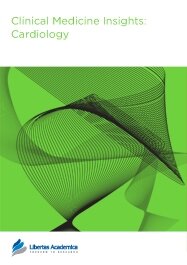

Publication Date: 16 Feb 2012
Type: Original Research
Journal: Clinical Medicine Insights: Cardiology
Citation: Clinical Medicine Insights: Cardiology 2012:6 45-51
doi: 10.4137/CMC.S8654

Background: In neonates, the increase in O2-delivery (DO2) by dopamine is offset by a greater increase in O2-consumption (VO2). This has been attributed to β3-adrenergic receptors in neonatal brown fat tissue. β3 receptors in the heart have negative inotropic properties. We evaluated the effects of SR59230A, a β3-antagonist, on the balance of systemic and myocardial O2-transport in newborn lambs treated with dopamine.
Methods: Lambs (2–5 days old, n = 12) were anesthetized and mechanically ventilated. Heart rate (HR) and rectal temperature were monitored. VO2 was measured by respiratory mass spectrometry and cardiac output (CO) by a pulmonary artery transonic flowmeter. Arterial, jugular bulb venous and coronary sinus blood gases and lactate were measured to calculate DO2, O2 extraction ratio (ERO2), myocardial O2 and lactate extraction ratios (mERO2, mERlac). After baseline measurements, lambs were randomized to receive SR59230A at 5 mg/kg iv (SRG) or placebo. Both groups received incremental doses of a dopamine infusion (0–5–10–15–20 mcg/kg/min) every 15 min. Measurements were repeated at the end of each dose.
Results: After SR59230A infusion, CO and HR trended to decrease (P = 0.06), but no significant changes occurred in other parameters. Over the incremental doses of dopamine, temperature increased in both groups (P < 0.0001) but to a lesser degree in SRG (P = 0.004). CO and HR increased (P = 0.005 and 0.04) and similarly in both groups (P > 0.1). DO2 trended to a small increase (P = 0.08). VO2 increased in both groups (P < 0.0001) but to a lesser degree in SRG (P < 0.0001). As a result, ERO2 increased in both groups (P < 0.0001), but to a lesser degree in SRG (P < 0.0001). mERO2 was lower in SRG (P = 0.01) with a faster increase (P < 0.0001). mERlac was higher in SRG (P = 0.06) with a faster decrease (P = 0.04).
Conclusion: Although SR59230A tends to induce an initial drop in CO, it significantly attenuates the rise in VO2 and hence the imbalance of systemic and myocardial O2 transport induced by dopamine at higher doses. Studies are warranted to examine the effect of SR59230A in cases of cardiac dysfunction and increased VO2, observed after cardiac surgery.
PDF (3.47 MB PDF FORMAT)
RIS citation (ENDNOTE, REFERENCE MANAGER, PROCITE, REFWORKS)
BibTex citation (BIBDESK, LATEX)
XML
PMC HTML

The review process in Libertas Academica journals is prompt, objective and rigorous. The entire process is smooth and clear and all the editorial staff are cooperative and professional. Published papers are of top clinical and scientific value, and high metrics reflect the excellent quality of Libertas Academica's journals.

All authors are surveyed after their articles are published. Authors are asked to rate their experience in a variety of areas, and their responses help us to monitor our performance. Presented here are their responses in some key areas. No 'poor' or 'very poor' responses were received; these are represented in the 'other' category.See Our Results
Copyright © 2013 Libertas Academica Ltd (except open access articles and accompanying metadata and supplementary files.)
Facebook Google+ Twitter
Pinterest Tumblr YouTube